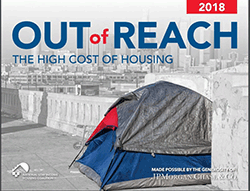Published on:
 Washington has the 7th worst shortfall between average renter wage and two-bedroom housing wage, according to the 2018 Out of Reach report from the National Low Income Housing Coalition (NLIHC).
Washington has the 7th worst shortfall between average renter wage and two-bedroom housing wage, according to the 2018 Out of Reach report from the National Low Income Housing Coalition (NLIHC).
The new report compares Housing Wages in all 50 states, the District of Columbia, plus Puerto Rico and more than 3,000 counties nationwide. (Housing Wage is the estimated full-time hourly wage a household must earn to afford a decent rental home at HUD’s Fair Market Rent while spending no more than 30% of their income on housing costs.)
This year’s recorded hourly rate needed to live in a two-bedroom rental in the Seattle-Bellevue metro area was $36.12, a jump of nearly 22 percent from last year when it was $29.69. Based on the state’s minimum wage of $11.50, an individual would need to work around 93 hours a week (the equivalent of 2.3 full-time jobs) to afford that rental. For a one-bedroom rental, that worker would need to clock 75 hours.
Statewide, where there are more than a million renter households (about 38 percent of the total), a household must earn $26.87 per hour ($55,886 annually) in order to afford the Fair Market Rent of $1,397 for a two-bedroom rental home. That translates to a gap of $7.96, with only six other states having larger shortfalls. Hawaii’s gap is a whopping $19.98.
Nationally, the 2018 Housing Wage is $22.10 for a modest two-bedroom rental home and $17.90 for a one-bedroom rental. Comparing the states, the Housing Wage ranges from a low of $13.84 in Arkansas to a high of $36.13 in Hawaii.
At $26.87, Washington’s Housing Wage is surpassed by Hawaii, California, New York, Maryland, Massachusetts and New Jersey. The Evergreen State’s Fair Market Rent (FMR) for a two-bedroom apartment is $1,397. In order to afford this level of rent and utilities — without paying more than 30% of income on housing — a household must earn $4,657 monthly or $55,886 annually.

Source: Out of Reach 2018 | National Low Income Housing Coalition
In no state, metropolitan area or county can a worker earning the federal minimum wage or prevailing state minimum wage afford a two-bedroom rental home at fair market rent by working a standard 40-hour week, according to the report. Of more than 3,000 counties surveyed for the report, a full-time minimum wage worker could afford a one-bedroom rental home at fair market rent in only 22 of them. All 22 counties are in states with a minimum wage higher than $7.25.
In a preface to the 284-page report, U.S. Senator Bernie Sanders urged big thinking and bold actions to address the affordable housing crisis. “We must make a historic and sustained commitment to ensure every family has an affordable place to live and thrive,” he wrote.
The senator from Vermont recommended several actions, including:
- Significantly expanding federal investments in affordable housing through programs like the National Housing Trust Fund, the HOME program “and other critically important resources;”
- Extending rental assistance and other housing benefits to the millions of low income families who need help to make ends meet;
- Stemming the rising tide of evictions and investing in innovative strategies aimed at eliminating homelessness;
- Start closing the housing wage gap by raising the minimum wage to at least $15 an hour so no full-time worker lives in poverty.
The National Low Income Housing Coalition provides up-to-date information, formulates policy, educates the public on housing needs and strategies for solutions, and advocates to ensure decent, affordable housing for everyone. Its work is supported by donors, underwriting by large organizations, various State Coalition Partners (including the Washington Low Income Housing Alliance), and various national groups.
NLIHC was established in 1974 by Cushing N. Dolbeare. Funding for the latest report was provided by J.P. Morgan Chase.